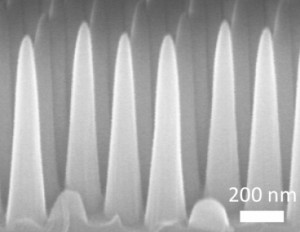Magic Glass – Anti-fogging, Self-cleaning and Free of Glare
 One of the most instantly recognizable features of glass is the way it reflects light. But a new way of creating surface textures on glass, developed by researchers at MIT, virtually eliminates reflections, producing glass that is almost unrecognizable because of its absence of glare — and whose surface causes water droplets to bounce right off, like tiny rubber balls.
One of the most instantly recognizable features of glass is the way it reflects light. But a new way of creating surface textures on glass, developed by researchers at MIT, virtually eliminates reflections, producing glass that is almost unrecognizable because of its absence of glare — and whose surface causes water droplets to bounce right off, like tiny rubber balls.
The new “multifunctional” glass, based on surface nanotextures that produce an array of conical features, is self-cleaning and resists fogging and glare, the researchers say. Ultimately, they hope it can be made using an inexpensive manufacturing process that could be applied to optical devices, the screens of smartphones and televisions, solar panels, car windshields and even windows in buildings.
Source: Through a glass, clearly
The technology is described in a paper published in the journal ACS Nano, co-authored by mechanical engineering graduate students Kyoo-Chul Park and Hyungryul Choi, former postdoc Chih-Hao Chang SM ’04, PhD ’08 (now at North Carolina State University), chemical engineering professor Robert Cohen, and mechanical engineering professors Gareth McKinley and George Barbastathis.
Photovoltaic panels, Park explains, can lose as much as 40 percent of their efficiency within six months as dust and dirt accumulate on their surfaces. But a solar panel protected by the new self-cleaning glass, he says, would have much less of a problem. In addition, the panel would be more efficient because more light would be transmitted through its surface, instead of being reflected away — especially when the sun’s rays are inclined at a sharp angle to the panel. At such times, such as early mornings and late afternoons, conventional glass might reflect away more than 50 percent of the light, whereas an anti-reflection surface would reduce the reflection to a negligible level.
While some earlier work has treated solar panels with hydrophobic coatings, the new multifunctional surfaces created by the MIT team are even more effective at repelling water, keeping the panels clean longer, the researchers say. In addition, existing hydrophobic coatings do not prevent reflective losses, giving the new system yet another advantage.
Continue Reading: Through a glass, clearly

Leave a Reply
Want to join the discussion?Feel free to contribute!